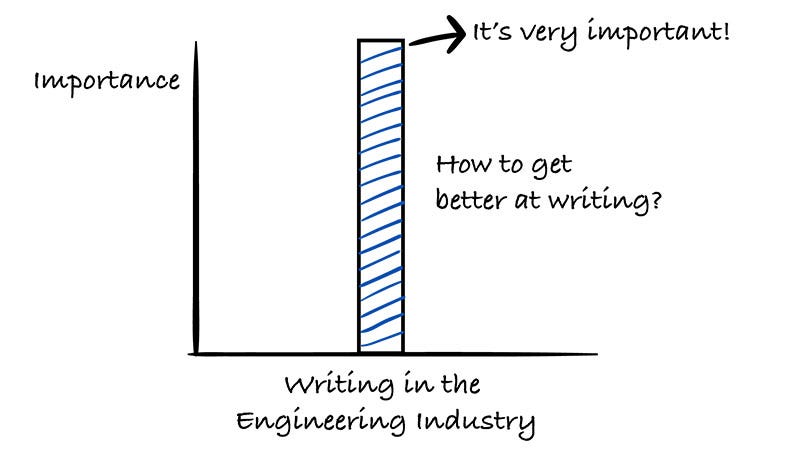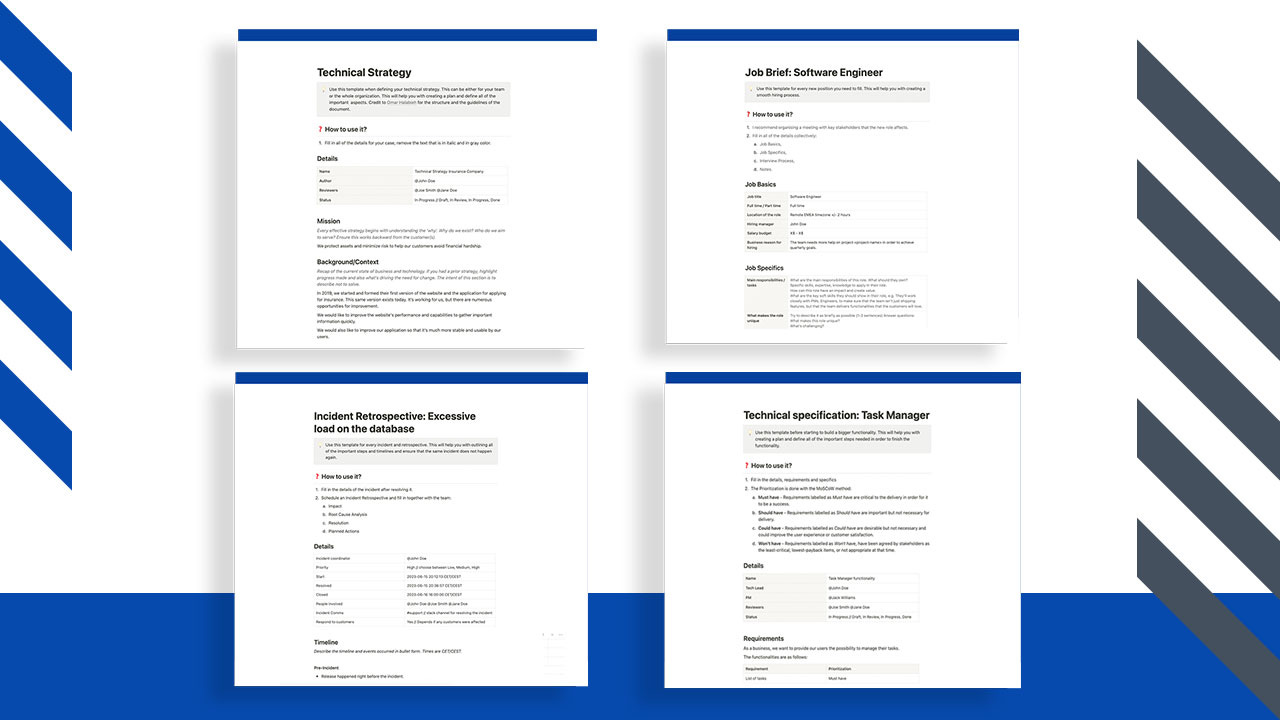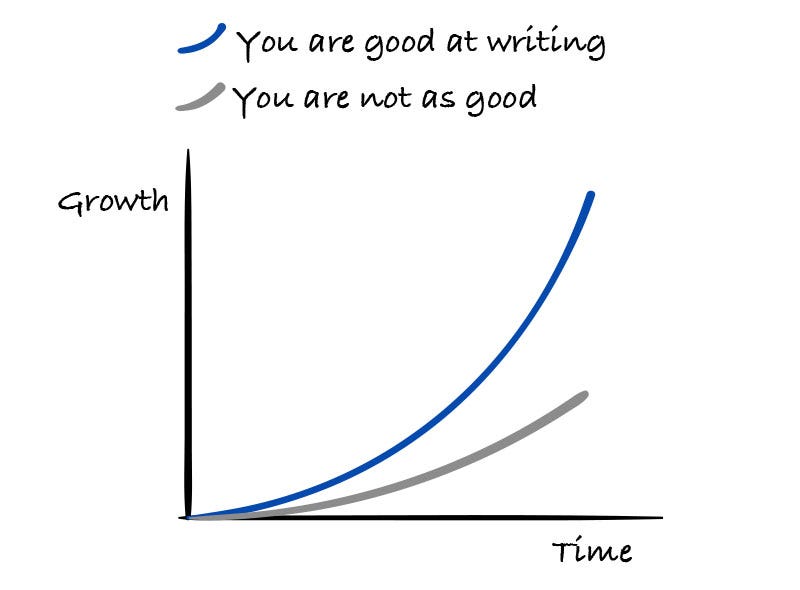The Importance of Writing in the Engineering Industry
Why writing is very important and how to get better at writing as an engineer or a manager? I am sharing my top tips from 2.5+ years of actively writing online!
Intro
Being able to write well is becoming more and more important in the engineering industry. The reason is that the majority of our communication goes through writing.
We are aligning via Slack, we are doing code reviews, we are writing tech specs and obviously, we also write code.
Writing is unavoidable and being good at it is a skill that will really help you to provide more value to the organization and also grow in your career as an engineer or a manager.
I like to say that good writing is a superpower for both engineers and managers. And this is a good example. If you can:
Give a lot of context in a few written words in your status updates.
Write very easy-to-read messages.
Write easy-to-understand documentation.
This automatically transfers to writing good code as well. The mindset is the same → You write code in a way that everyone else around you (including your future self) can easily understand it.
This is an article for paid subscribers, and here is the full index:
- Why is writing so important in the engineering industry?
- Writing ensures alignment between people, teams and also with the business
- Here are the templates that you can use
- Good writing skills are especially crucial for engineering leaders
- Being good at writing will help you to progress in your career much faster
- Here are my top tips for getting better at writing
- 1. Understand the purpose of your message
🔒 2. Use simple words and sentences
🔒 3. Get to the point
🔒 4. Show don’t tell
🔒 5. Have a clear and consistent structure
🔒 6. Remove unnecessary words
🔒 7. Start writing online
🔒 Last words
Let’s get into more detail about it next.
Why is writing so important in the engineering industry?
Imagine being a part of a bigger organization and all the members communicate verbally and not in a written form. What would happen? There would be a whole lot of misunderstandings and misalignments.
It would be close to impossible to operate successfully this way. The reason is that verbal communication doesn’t scale well and it’s always needed to be repeated.
If you express your thoughts or make a certain decision in a written form, you write it once and you don’t need to repeat it. You just need to make sure that people know where to find it and they understand it.
This is especially important in the engineering industry. For example, If two teams are not aligned and they are both building something totally different than expected. This can make or break the business.
And I am estimating, we are spending roughly 50-70% of the time writing as Software Engineers. The amount of time we spend doing specific writing activities varies based on seniority, overall responsibilities and it’s specific to the organization.
For example, Amazon is known for having a strong written culture. People spend more time writing there than they might in other companies.
Overall, as you can see, writing is a big part in the engineering industry and getting better at it is nonnegotiable in order to thrive both as an engineer and a manager.
Writing ensures alignment between people, teams and also with the business
The bigger the organization, the bigger the need for written documents. My recommendation for written documents differs if I am advising a startup or a bigger organization.
The most applicable to the majority are mid-size companies of around 50-250 employees. Let’s go through my recommendation for that size.
This is what I suggest (priority is added with the MoSCoW method):
1. Product specifications (Must have)
Without good specifications of the product, nobody will understand it anymore.
2. Technical specifications (Should have)
Important in order to align on the technical implementation
3. Coding style guides (Must have)
Style guides are needed in order to ensure consistency.
4. Coding guidelines (Must have)
It’s really important that all of the engineers are aligned on what to do and what not to do.
5. Technical strategy (Must have)
Important to understand the vision and define short and long-term goals.
6. Documentation of various processes (Incident Management, Job Brief, Onboarding, etc) (Should have)
Important to document every process that takes place. That’s how we can align on it and adjust when needed.
Here is the visual presentation of my suggestions:
Here are the templates that you can use
1. Notion Template: Technical Specification
The template to define a great technical plan for your next functionality. Great planning, often leads to great success.
2. Notion Template: Incident Retrospective
The template to note everything down when the incident occurs. That’s the best way to have a complete overview of the problem and how to resolve it.
3. Notion Template: Job Brief
The template for every new position you need to fill. This will help you with creating a smooth hiring process.
4. Notion Template: Technical Strategy
The template for defining your technical strategy. This can be either for your team or the whole organization.
As a paid subscriber, you can get the templates mentioned above + all 20 Guides and Templates + 4 Infographics here: 🎁 Products for paid subscribers.
Good writing skills are especially crucial for engineering leaders
The more you grow in your career, the bigger the need for effective writing is. For engineering leaders, it’s crucial to be good at it.
As an engineering leader, you are setting an example for others on how to write effectively.
It’s really important that your writing not only has substance but that it’s also easily understandable. You can have the best process in the world, but if your document is not clear and the team doesn’t understand what is expected from them, the process will not work as you might expect it to.
Especially, I want to point out how crucial effective writing is for developing a great tech strategy for an organization.
You need to align not only with your team but also with the whole organization.
This is a great article to read:
Being good at writing will help you to progress in your career much faster
Now that we know and understand why writing is so important in our industry, we can conclude that if you are good at writing, you will be progressing in your career much faster.
There are a number of different ways how you can improve your writing skills and the best way to do it is to know and understand a set of simple principles and practice, practice and more practice.
I’ve been focusing on writing online for more than 2.5 years and here are my top tips.
Here are my top tips for getting better at writing
1. Understand the purpose of your message
With every article that I write, I want to ensure I know these 3 things clearly:
Why am I creating the article? To educate and help as many people as possible to become great engineering leaders.
For who am I writing? Engineers and managers are the target audience.
What key message do I want to share? In this case, I wish to raise awareness of how important writing is in the engineering industry and also share my top tips on how to get better at writing.
Understanding your purpose shapes your tone, structure, and overall content.
Example: An email to a coworker about a project update will be different in tone and detail than an article meant to explain a complex idea to a general audience.
So, when you know your purpose, your message becomes more focused and effective.
That’s where empathy becomes very important. If you can put yourself in the shoes of the person you are writing to, you will write in a way that resonates with them!







